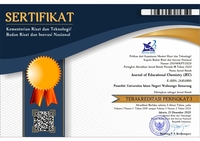The Correlation Between Project Learning Models and Student Activities in Online Learning for Chemistry Innovative Learning Model
DOI:
https://doi.org/10.21580/jec.2023.5.1.14742Keywords:
project learning, effectiveness, learning activitiesAbstract
This study aims to determine the effectiveness of project learning on student activity in chemistry innovative learning models courses. The research conducted used the experimental method. The results showed that students’ activeness in action was included in the successful category, which is 72.7%, and student activity in understanding the innovative learning model was included in the successful category, which is 63.6%. Student responses to project learning are included in the very successful category at 81.8%. The results of statistical research using partial regression correlation analysis techniques and multiple correlations show a significant positive relationship between project learning and learning effectiveness with a correlation coefficient (ry1) = 0.201. A significant positive relationship exists between student activities in innovative chemistry learning models and learning effectiveness with a correlation coefficient (ry2) = 0.759. There is a significant positive relationship between project learning and student activities and learning effectiveness with a correlation coefficient (ry12) = 0.769. Based on the results of these studies, it can be concluded that the effectiveness of learning can be increased through project learning and student activities.Downloads
References
Adit, A. 2020. 12 Aplikasi Pembelajaran Daring Kerjasama Kemendikbud, Gratis! (2020, March 22). Retreived from https://edukasi.kompas.com/read/2020/03/22/123204571/12-aplikasi-pembelajaran- daring-kerjasama-kemendikbud-gratis?page=all
Budiansyah, A. 2020. Internet Digratiskan Selama Wabah Corona di RI, Setuju? (2020, April 27). Retreived from https://www.cnbcindonesia.com/tech/20200407180620-37-150401/internet- digratiskan-selama-wabah-corona-di-ri- setuju.
Berkowitz, M. W., & Hoppe, M. 2019. Character Education and Gifted Children. High Ability Studies, 20(2), 131-142.
Brady, A. & Higgins, R. M. 2017. Creative Excellence in the Japanese University: Knowledge-Content-Cognition and Language-Culture-Communication Integrated Global Awareness Learning. Creative Education, 6(21), 17-35.
Chasanah, A. R. U., Khoiri, N. & Nuroso, H. 2016. Efektivitas Model Project Based Learning terhadap Keterampilan Proses Sains dan Kemampuan Berpikir Kreatif Siswa pada Pokok Bahasan Kalor Kelas X SMAN 1 Wonosegoro Tahun Pelajaran 2014/2015. Jurnal Penelitian Pembelajaran Fisika. 7 (1), 19-24.
Fakhruddin, M., Ananda, R., & Istiningsih, R. 2023. Perubahan Paradigma dalam Organisasi Belajar di Abad 21. Perspektif Ilmu Pengetahuan, 21(2), 110-117
Gardner, H. 1983. Frames Of Mind. New York: Basic Books Inc.
Gay, L. R., Geoffrey E. Mills, and Peter Airasian. 2012. Educational Research Competencies for Analysis and Applications. New York: Pearson.
Gunawan, Suranti, N. M. Y. & Fathoroni 2020. Variations of Models and Learning Platforms for Prospective Teachers During the COVID-19 Pandemic Period. Indonesian Journal of Teacher Education, 1(2), 61-70.
Hermann, M., Pentek, T. & Otto, B. 2016 Design Principles for Industrie 4.0 Scenarios. Proceedings of 49th Hawaii International Conference on System Sciences HICSS, Koloa, 5-8 January 2016, 3928-3937.
Kagermann, H., Wahlster, W. & Helbig, J.. 2013. Securing the Future of German Manufacturing Industry: Recommendations for Implementing the Strategic Initiative Industrie 4.0. Final Report of the Industrie 4.0 Working Group, Acatech— National Academy of Science and Engineering, 678.
Made Wena. 2019. Strategi Pembelajaran Inovatif Komtemporer Suatu Tinjauan Konseptual Operasional. Malang : Bumi Aksara
Manasikana, O. A., Wijayadi, A. W., & Mayasari, A. 2022. Keefektifan Pembelajaran Proyek Terhadap Keaktifan dan Kreatifitas Mahasiswa Mata Kuliah Model Pembelajaran Inovatif IPA Materi Kimia SMP. Zarah, 10(1), 66–72.
Noor, ME., Hardyanto, W & Wibawanto, H. 2017. Penggunaan E-Learning dalam Pembelajaran Berbasis Proyek di SMA Negeri 1 Jepara. Innovative Journal of Curriculum and Educational Technology, 6 (1), 17-26.
Sahin, A. 2023. STEM Project-Based Learning. Boston, USA: SensePublisher.
Subando, J. 2020. Statistika Pendidikan. Yogyakarta: CV Gerbang Media Aksara.
Subando, J. 2021. Teknik Analisis Data Kuantitatif. Klaten: Lakeisha.
Widiyanti, S., & Dyah, R. 2021. Efektifitas Pembelajaran Berbasis Proyek Terhadap Kreativitas Mahasiswa di Pandemi Covid 19. Journal IT CIDA, 7(1), 35–47.
Yulianci, S., Nurjumiati., & Asriadin. 2020. Analisis Karateristik Gaya Belajar VAK (Visual, Auditorial, Kinestetik) Siswa pada Pembelajaran Fisika. Jurnal Pendidikan MIPA, 10(1), 40–44.
Downloads
Published
How to Cite
Issue
Section
License
The copyright of the received article shall be assigned to the journal as the publisher of the journal. The intended copyright includes the right to publish the article in various forms (including reprints). The journal maintains the publishing rights to the published articles.
Authors are permitted to disseminate published articles by sharing the link/DOI of the article at the journal. Authors are allowed to use their articles for any legal purposes deemed necessary without written permission from the journal with an acknowledgment of initial publication to this journal.

This work is licensed under a Creative Commons Attribution-NonCommercial-ShareAlike 4.0 International License.


